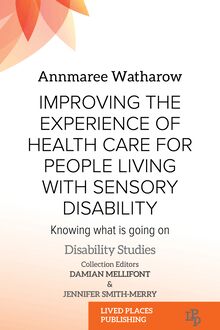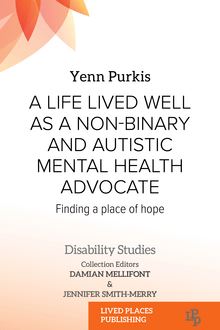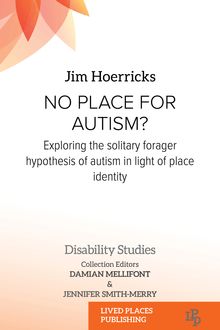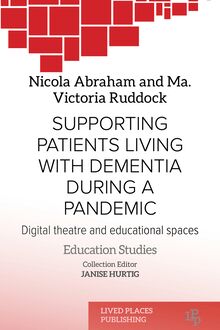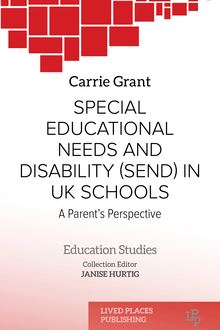-
 Univers
Univers
-
 Ebooks
Ebooks
-
 Livres audio
Livres audio
-
 Presse
Presse
-
 Podcasts
Podcasts
-
 BD
BD
-
 Documents
Documents
-
- Cours
- Révisions
- Ressources pédagogiques
- Sciences de l’éducation
- Manuels scolaires
- Langues
- Travaux de classe
- Annales de BEP
- Etudes supérieures
- Maternelle et primaire
- Fiches de lecture
- Orientation scolaire
- Méthodologie
- Corrigés de devoir
- Annales d’examens et concours
- Annales du bac
- Annales du brevet
- Rapports de stage
La lecture à portée de main
Vous pourrez modifier la taille du texte de cet ouvrage
Découvre YouScribe en t'inscrivant gratuitement
Je m'inscrisImproving the Experience of Health Care for People Living with Sensory Disability , livre ebook
Découvre YouScribe en t'inscrivant gratuitement
Je m'inscrisEn savoir plus
Vous pourrez modifier la taille du texte de cet ouvrage
En savoir plus

Description
How does a patient with sensory disability – such as a hearing or vision impairment, or both – get effective communication from a health care provider?
Too often, the answer is that they don’t. Communication is crucial for any professional–patient relationship, not least when disability is in the mix. For people living with sensory disability, however, the challenge of knowing what is going on with their healthcare, participating in shared decision making, and retaining an appropriate level of agency, is even greater. Using verbatim testimony from people with first-hand experience of sensory disability, this book explores issues such as accessibility barriers in consent forms, patient information sheets and other paperwork; situational vulnerability to abuse and neglect; and dehumanisation, infantilisation, and disempowerment in care.
Written by Dr Annmaree Watharow MD PhD, a doctor and author with personal experience of sensory disability, the stories in this book are told using people’s own words, to allow readers to hear directly from the people who most need their own agency. Vital reading for doctors, nurses, health care providers, and social support workers in practice and training, this book will change the way you view sensory disability.
Introduction
Chapter 1: Miscommunication and pain
Chapter 2: The undeniable importance of communication
Chapter 3: Who are we?
Chapter 4: Health threats
Chapter 5: The triple burden of COVID-19
Chapter 6: What really happens in hospitals
Chapter 7: Security. Knowledge. Power.
Chapter 8: The expert-knowers speak
Chapter 9: Respect. Communication. Care.
Chapter 10: Strategies for systemic transformation
Recommended further reading
Suggested learning activities
Sujets
Informations
| Publié par | Lived Places Publishing |
| Date de parution | 22 février 2023 |
| Nombre de lectures | 0 |
| EAN13 | 9781915271433 |
| Langue | English |
Informations légales : prix de location à la page 0,1250€. Cette information est donnée uniquement à titre indicatif conformément à la législation en vigueur.
Extrait
Improving the experience of healthcare for people living with sensory disability
Annmaree Watharow PhD, MD
Improving the experience of healthcare for people living with sensory disability
The Disability Studies Collection
Collection editors
Damian Mellifont & Jennifer Smith-Merry
First published in 2023 by Lived Places Publishing
All rights reserved. No part of this publication may be reproduced, stored in a retrieval system, or transmitted in any form or by any means, electronic, mechanical, photocopying, recording or otherwise, without prior permission in writing from the publisher.
The authors and editors have made every effort to ensure the accuracy of information contained in this publication, but assume no responsibility for any errors, inaccuracies, inconsistencies and omissions. Likewise, every effort has been made to contact copyright holders. If any copyright material has been reproduced unwittingly and without permission the Publisher will gladly receive information enabling them to rectify any error or omission in subsequent editions.
Copyright © 2023 Lived Places Publishing
British Library Cataloguing in Publication Data
A CIP record for this book is available from the British Library
ISBN: 9781915271426 (pbk)
ISBN: 9781915271440 (ePDF)
ISBN: 9781915271433 (ePUB)
The right of Annmaree Watharow to be identified as the Author of this work has been asserted by them in accordance with the Copyright, Design and Patents Act 1988.
Cover design by Fiachra McCarthy
Book design by Rachel Trolove of Twin Trail Design
Typeset by Newgen Publishing UK
Lived Places Publishing
Long Island
New York 11789
www.livedplacespublishing.com
Acknowledgement of country
I acknowledge and pay my deepest respects to the Gadigal people of the Eora Nation, the traditional custodians of the land that I live and work on. I am writing from my home, on land the richness of which has inspired, supported, and housed my life experiences, my ongoing career, and my storytelling. In this, I recognise the continued connection of First Nation’s people to the land on which I live, and the broader Australia, and I pay respects to the Elders past, present, and future. I acknowledge that it always was and always will be Aboriginal land.
Acknowledgements
Thank you to the loveliest editor, Rebecca Bush. Without you this would be a true masterpiece of word-salad and content mishmash.
People like myself, who live with communication disability, are often dependent on creative and talented human support. This book would not exist without the following:
Susannah McNally
Suzanne Wilding-Hart
Grace McKenzie
Ronnith Morris
Georgia Fagan
Roslyn Barnes
Sue Joseph
Sarah Wayland
Delia Falconer
Ly Ly Lim
To Tony, Hannah-Rose, Oliver, Georgia, and Eddie, the family that is “simply the best, better than all the rest.”
Thank you to the work, help, and guidance from:
David Parker
Jennifer Smith-Merry
Damian Mellifont
Abstract
Going to hospital can be a profoundly negative experience for people who live with sensory loss/es. And it is not the illnesses or injuries that threaten health and wellbeing, but experiencing, or rather not experiencing, care and communication. This book will examine firstly how important communication is for all patients. Sensory loss/es are common and increasing rapidly in prevalence as the population ages. These are invisible disabilities and those who live with them are found everywhere, yet are often unseen, uncounted, and unsupported. People living with sensory loss/es are subject to greater health threats than those without and this means they/we land in hospital more frequently, stay for longer, and suffer misadventure and neglect. The COVID-19 pandemic has exacerbated pre-existing inequities and created new layers of difficulty in hospital care and communication. I demonstrate these with verbatim testimonies from my own experience and those of research participants who tell their stories in their own ways, in their own time, and with whatever storytelling assistive devices, supports, and interpreters they need. To change the status quo requires three broad actions: harness the patients’ own capabilities; revolutionise the way professionals care and communicate; and transformation of the present ableist health and societal institutions. One single imperative is common for all students and professionals reading this book, communication is your responsibility: ASK, Acquire Specific Knowledge of each individual with disability, with sensory loss/es. What do they need? And then provide these.
Keywords
Deafblindness, dual sensory impairment, dual sensory loss, sensory loss, deaf, blind, low vision, lived experience, patient experiences, disability, communication
Contents
Content warning xv
Learning objectives xvii
Introduction 1
Chapter 1 Miscommunication and pain 25
Chapter 2 The undeniable importance of communication 41
Chapter 3 Who are we? 59
Chapter 4 Health threats 85
Chapter 5 The triple burden of COVID-19 105
Chapter 6 What really happens in hospitals 133
Chapter 7 Security. Knowledge. Power 155
Chapter 8 The expert-knowers speak 169
Chapter 9 Respect. Communication. Care 195
Chapter 10 Strategies for systemic transformation 215
Recommended further reading 239
Suggested learning activities 241
References 243
Content warning
This book contains references to and descriptions of medical abuse and neglect, elder abuse, and acts of ableism. References are frequent and throughout, but Chapters 5 and 6 in particular contain first-person descriptions of acts of violence and harm.
Learning objectives
By the end of this book, my hope is that you will be able to:
Understand
• The prevalence of disabilities and sensory loss/es
• The complexity of disabilities and sensory loss/es
• The health threats
• The predominately negative hospital experiences of those living with sensory loss/es
• How COVID-19 and disasters impact people living with disabilities and sensory loss/es
Ask
• How you can help
• What communication modes work for each individual
• What devices, aids, and supports are needed for each individual
Identify
• Communication problems and solutions
• The need for better, more responsive communication
Provide
• Support
• Interpreters
• Devices
• Aids
• Individual specific tools
• Appropriate and good care and communication
Practice
• Being inclusive
• “Walking the talk”
• Upskilling
• Supporting systemic change
• Doing your job in its entirety
• Owning your responsibilities
• Kindness
• Patience
Recognise
• That it is your responsibility to communicate effectively with your patients/clients/customers/constituents
Introduction
Disability is common, with just under 20% of the Australian population identifying with one or more disabilities ( SDAC, 2019 ). Aboriginal and Torres Strait Islander Australians , our First Peoples, experience disability at almost twice the rate of other Australians ( Avery, 2018 ). A lot of this disability is invisible . Sensory disability is common—and commonly invisible—and increases markedly with age. Multiple disability is common too, with rates ranging from 20% to 75% depending on age and type of disability ( World Federation of the Deafblind, 2018 ; SDAC, 2019 ). So, it cannot be understated: people living with disability (PLWD) are everywhere, but too often not seen.
Going to hospital and needing healthcare is common, but more so for people living with and managing disability. Hospitals are places where people are diagnosed with impairments, manage consequences and complications of impairments, bring disabilities with them (when they go for non-disability related conditions), and also where PLWD acquire new impairments . Hospitals are places where we rightly expect care and communication, shared decision-making and informed consent, and safety and respect. But PLWD don’t always receive these, be it when they go to hospital or visit wider healthcare institutions. One in five PLWD have problems communicating with health professionals (Australian Bureau of Statistics ( ABS, 2019 )). These issues of care and communication impact all of us directly and indirectly, whether it be ourselves, our parents, or grandparents; or through our taxes, as we pay for the consequences of substandard care experiences in readmissions, prolonged stays, delayed health help-seeking in future crises, and poorer health outcomes.
My lived experience
Doctors are often seen as shiny, golden people: they have to dazzle at school to get into medical degrees, and they have to maintain their sparkle among so much other glitter over courses and careers.
Few medical students and doctors live with disability/ies, so our medical profession doesn’t reflect the wider community. If you’re a doctor with a disability (like I am) you quickly learn to be normal and act normal, even if you are not. Especially if you are not!
I have experience of living with disabilities. I was born with hearing loss to two parents who were shocked but committed to an oralism approach to learning, where I would be speech-therapied and hearing-aided into language and therefore able to pass as “normal”.
My first conscious experience of being denied participation because I was deaf occurred in year ten at school. I was competing for a place in the It’s Academic team. I should have been a shoo-in but I was “gently” extracted from try-outs, with Mrs Z explaining that I wouldn’t be able to compete. Imagine if I didn’t hear a question correctly or didn’t hear it all. Imagine how I would feel if I let the whole team and the whole school down. Instead, she decided that I should be the team manager—a prestigious position, and better even than competing.
The lesson: people could lie to me and to themselves if it alleviated their guilt. Of course, the team made it to the finals, then lost on a question I knew. It was not just Mrs Z’s low e
-
 Univers
Univers
-
 Ebooks
Ebooks
-
 Livres audio
Livres audio
-
 Presse
Presse
-
 Podcasts
Podcasts
-
 BD
BD
-
 Documents
Documents
-
Jeunesse
-
Littérature
-
Ressources professionnelles
-
Santé et bien-être
-
Savoirs
-
Education
-
Loisirs et hobbies
-
Art, musique et cinéma
-
Actualité et débat de société
-
Jeunesse
-
Littérature
-
Ressources professionnelles
-
Santé et bien-être
-
Savoirs
-
Education
-
Loisirs et hobbies
-
Art, musique et cinéma
-
Actualité et débat de société
-
Actualités
-
Lifestyle
-
Presse jeunesse
-
Presse professionnelle
-
Pratique
-
Presse sportive
-
Presse internationale
-
Culture & Médias
-
Action et Aventures
-
Science-fiction et Fantasy
-
Société
-
Jeunesse
-
Littérature
-
Ressources professionnelles
-
Santé et bien-être
-
Savoirs
-
Education
-
Loisirs et hobbies
-
Art, musique et cinéma
-
Actualité et débat de société
- Cours
- Révisions
- Ressources pédagogiques
- Sciences de l’éducation
- Manuels scolaires
- Langues
- Travaux de classe
- Annales de BEP
- Etudes supérieures
- Maternelle et primaire
- Fiches de lecture
- Orientation scolaire
- Méthodologie
- Corrigés de devoir
- Annales d’examens et concours
- Annales du bac
- Annales du brevet
- Rapports de stage
